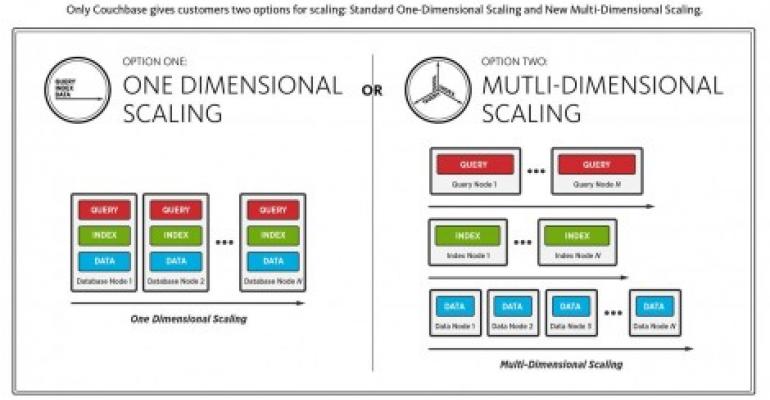Couchbase CEO Bob Wiederhold believes a revolution has been achieved in the NoSQL database’s architecture. The upcoming Couchbase 4.0 changed architecture so that three very different types of database tasks can run on different sets of servers optimized to do those tasks -- an alternative to using the same set of servers (a single node) to accomplish all three core tasks of read/write, indexing, and queries.
The big benefit is much better performance for index and queries, making Couchbase better at large-scale mission critical deployments. Couchbase and NoSQL in general have been strong with read/write tasks, data storage, and processing, but since three core types of database tasks usually run on a single node, either the node has to be ridiculously powerful or two types of tasks suffer reduced performance.
Each of the three types of database tasks has different demands from the underlying servers. Read/write is memory oriented; indexing is disk-intensive; querying needs a lot of CPU horsepower.
"Enterprises are faced with a broad range of data processing requirements, for which they have traditionally relied on extending the relational model and, more recently, combined a variety of specialist NoSQL databases," Matt Aslett, research director at 451 Research, said in an email. "Our research suggests that enterprises are making strategic investments in more agile, multi-model databases that serve a variety of needs. Couchbase's multi-dimensional scaling appears to be an innovative, flexible approach to supporting a wider range of data processing workloads, and the ability to scale multiple workloads independently increases the likelihood that customers will use the database to support multiple workloads simultaneously."
"Multi-dimensional scaling" is what Couchbase calls this capability. Widerhold said it doesn't have to be preconfigured in advance.
“During runtime you can make changes in how you configure your system," he said. "It’s possible to configure workloads on the fly.”
NoSQL adoption is occurring in three phases, according to Wiederhold. The first was grassroots development adoption and open source company adoption. Developers were playing around and bringing it into companies for small project. Wiederhold said that the criteria for success was ease of development. MongoDB was particularly strong here, he said.
The second phase was around 2013, with enterprises believing NoSQL had evolved to the point where it was suitable for more mission critical use cases. Operations became more involved in decisions. “It was a time of deep strategic evaluations. This is when Couchbase took off. We have very strong scalability and performance, differentiation against MongoDB.”
Beginning early next year, Weiderhold believes the third phase will be in full gear: wide deployment of NoSQL. “Strategic evaluations are done, the technology is considered stable enough to be deployed widely. This is being made in the context of a much bigger replatforming that is taking place. Major parts of the infrastructure software stack are changing right now.”
Enterprise IT is undergoing an evolution architecturally with the move toward cloud shaping the next generation. Web scale, mobile apps, and Internet of Things all depend on doing things a little differently in terms of databases, with NoSQL more suited to this world than relational databases.
“Relational databases have added features that appear to be similar to NoSQL, but they’re missing the point,” said Weiderhold. “They’re fundamentally different architectures and trade-offs.”
The 4.0 release will be out this summer and feature other enhancements, but Couchbase is currently focused on getting the word out about the new multi-dimensional scaling capability.
The company has other projects in the works as well. One example is N1QL (pronounced Nickel) Query, a language designed for ad-hoc, SQL-like querying on its NoSQL database.





